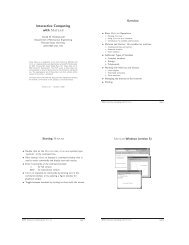"O Soul, Come Back!" A Study in The Changing Conceptions of The ...
"O Soul, Come Back!" A Study in The Changing Conceptions of The ...
"O Soul, Come Back!" A Study in The Changing Conceptions of The ...
You also want an ePaper? Increase the reach of your titles
YUMPU automatically turns print PDFs into web optimized ePapers that Google loves.
376 YING-SHIH YUIn order to clarify the term hun-ch 'i, a word may be said about thecomplex and difficult concept <strong>of</strong> ch 'i as the " source <strong>of</strong> life. " <strong>The</strong> concepthas a broad as well as a narrow mean<strong>in</strong>g. In its broad sense,ch 'i is a primal and undifferentiated life force which permeates theentire cosmos. However, when the ch'i becomes differentiated and<strong>in</strong>dividuated to form all the th<strong>in</strong>gs <strong>in</strong> the universe, it then varies <strong>in</strong>purity. Thus, as succ<strong>in</strong>ctly summed up by D. C. Lau, "the grosserch 'i, be<strong>in</strong>g heavy, settled to become the earth, while the ref<strong>in</strong>ed ch 'i,be<strong>in</strong>g light, rose to become the sky. Man, be<strong>in</strong>g half-way betweenthe two is a harmonious mixture <strong>of</strong> the two k<strong>in</strong>ds <strong>of</strong> ch /i. X 128 It is <strong>in</strong>this broad sense that a Taoist philosophical treatise <strong>of</strong> the secondcentury B.C. says that the hun is made up <strong>of</strong> the ref<strong>in</strong>ed, heavenlych 'i and the p'o the grosser, earthly ch 'i.29 But <strong>in</strong> its narrow sense,the ch'i refers specifically to the heavenly ch'i. It is <strong>in</strong> this narrowsense that the hun-ch 'i or the breath-soul is dist<strong>in</strong>guished from the hs<strong>in</strong>g-p'o or bodily soul.We have seen that it was a general belief <strong>in</strong> Han Ch<strong>in</strong>a that thehun owes its existence to the ref<strong>in</strong>ed ch 'i from heaven while the p 'o,be<strong>in</strong>g always associated with the body, is composed <strong>of</strong> the coarse ch 'ifrom earth. But how are the two souls, hun and p'o, dist<strong>in</strong>guishedfrom each other <strong>in</strong> terms <strong>of</strong> specific functions? Accord<strong>in</strong>g to ChengHsiian (127-200), ch'i or hun-soul forms the basis <strong>of</strong> a man's spiritand <strong>in</strong>telligence whereas the function <strong>of</strong> the p 'o soul is specifically def<strong>in</strong>edas "hear<strong>in</strong>g dist<strong>in</strong>ctly and see<strong>in</strong>g clearly."30 In other words,the hun governs man's spirit (shen t <strong>in</strong>clud<strong>in</strong>g hs<strong>in</strong>, m<strong>in</strong>d or heart)28D. C. Lau, "Introduction" to his translation <strong>of</strong> Mencius (Harmondsworth: Pengu<strong>in</strong>Books, 1970), p. 24.29Liu Wen-tien WIJ[3ZC, Huai-nan hung-lieh chi-chieh '(KHCP), 9.2a.30 Li-chi chu-su 47.14a-15a. In this connection I wish to call the reader's attention to Mencius'famous dist<strong>in</strong>ction between the ta-t 'i )t. and hsiao-t 'i dMIR ("<strong>The</strong> parts <strong>of</strong> greater importanceand the parts <strong>of</strong> smaller importance <strong>of</strong> the person <strong>of</strong> a man.") Accord<strong>in</strong>g to him(Mencius, 6A/14, D. C. Lau's translation), the hsiao-t'i consists <strong>of</strong> "the organs <strong>of</strong> hear<strong>in</strong>g andsight" which "are unable to th<strong>in</strong>k and can be misled by external th<strong>in</strong>gs" whereas the ta-t 'i isidentified as "the organ <strong>of</strong> the m<strong>in</strong>d or heart" whose function it is "to th<strong>in</strong>k." Menciusspecifically s<strong>in</strong>gles out this th<strong>in</strong>k<strong>in</strong>g organ <strong>of</strong> the m<strong>in</strong>d or heart as the gift that man alonereceives from Heaven. <strong>The</strong>refore, he def<strong>in</strong>es "a great man" as one who is guided by the <strong>in</strong>terests<strong>of</strong> his ta-t 'i (i.e., the th<strong>in</strong>k<strong>in</strong>g m<strong>in</strong>d) and "a small man" as one who is guided by the <strong>in</strong>terests<strong>of</strong> his hsiao-t 'i (i.e. the organs <strong>of</strong> hear<strong>in</strong>g and sight). Moreover, Mencius further holdsthat there is a "flood-like ch/i " ("hao-jan chih ch/'i" _t A) <strong>in</strong> the cosmos that is, <strong>in</strong> thehighest degree, vast and unyield<strong>in</strong>g. It is this ch'i that provides the m<strong>in</strong>d or heart with thevery source <strong>of</strong> moral power. (Mencius, 2A/2) Clearly, then, Mencius must have shared thecosmological view current <strong>in</strong> the fourth century B.C. that man's body consists <strong>of</strong> the grosser,















